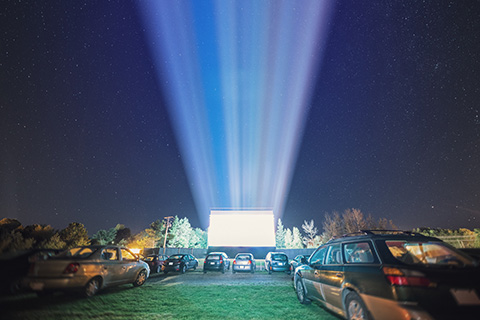The adage “absence makes the heart grow fonder” doesn’t just apply to people. During the pandemic crisis we’ve all had to forego many routine experiences that we may have taken for granted, not have realizing how much we’d miss them when they are gone. People are anxious to see movies on the big screen again, and going back to the drive-in model may provide a way to do so while staying safe.
In New Jersey, the permanent Delsea Drive-In movie theatre was allowed to reopen last month, and other venues are trying a pop-up approach as well. The Kathedral Events Center in Hammonton NJ has announced their “Karpool Cinema” Series, where they will project movie video onto a 40-foot screen, projecting the sound through a FM radio station. Not only will people follow the social distancing rules, but the parking lot will also be repartitioned to ensure that the cars will be parked roughly 10 feet apart from each other.
This may provide an avenue for die-hard movie-theater goers, but it may not reflect what will happen to the industry as a whole. In May 2019, we published Has the Avengers series stalled the endgame for movie theatres? about a new record and resurgence in movie theatre attendance for the release of Avengers: End Game. We examined changes in the movie theatre industry. The crisis provided the opportunity to try out the Premium Video On-Demand (PVOD) model for family blockbusters, and some studios found they may want to continue with that model even after all theaters are allowed to reopen.
In April, Trolls: World Tour was released on the PVOD model, and it earned almost $100 million in the first three weeks of its release. Last month, Scoob was released on PVOD, and though the numbers haven’t been released for the number of rentals there are other indications of success. With this model, the studios cut out the middle man of the movie theatre, and take in comparatively more of the gross revenue, so they don’t need high gross receipts to achieve the same net profit.
Depending on the size of the family, a PVOD rental for $20 with snacks prepared at home could be significantly less expensive than the movie-theatre experience. Movies at home are not a new concept, and movie theaters were still drawing crowds before the crisis. The communal experience of going to the movies, and experiencing the larger picture and sound quality, has justified ticket sales in the past.
Why wouldn’t it do so again once theaters have reopened?
Simply put, habits aren’t revisited unless there is an event to do so, and the pandemic crisis was such an event. For some, it made the heart grow fonder. For others, it made them realize they could go without or enjoy a different model. This Variety article provides survey results from events analytics firm Performance Research, in partnership with Full Circle Research Co. It shows that 70% of consumers would prefer to watch first-run movies at home. Not only that, but many respondents suggested that they would not be comfortable going to other events until a fair amount of time passes after the country opens back up. That would suggest the return to the old normal may not happen as quickly as hoped by the event planners.
In our May article, we also reflected on the competition that the videogame industry generally was creating for movie theatres, and how many were now viewing the videogame Fortnite as their competition. Beyond their regular gaming interface, the platform has been converted to a virtual environment for concerts and other events during the crisis. In April, over 12 million people attended Travis Scott’s concert, where they could mingle with others and have their virtual avatars dance. Christopher Nolan has announced that he’s bringing one of his movies to the Fortnite platform this summer. This approach of attending events virtually, with no risk of exposure or the audience being limited to a geographic location to attend, may end up continuing to be competition for these events even once all crisis restrictions are lifted.
We’re excited to revisit previous past times as restrictions loosen up, but are also excited for some of the new ways to connect to continue.





